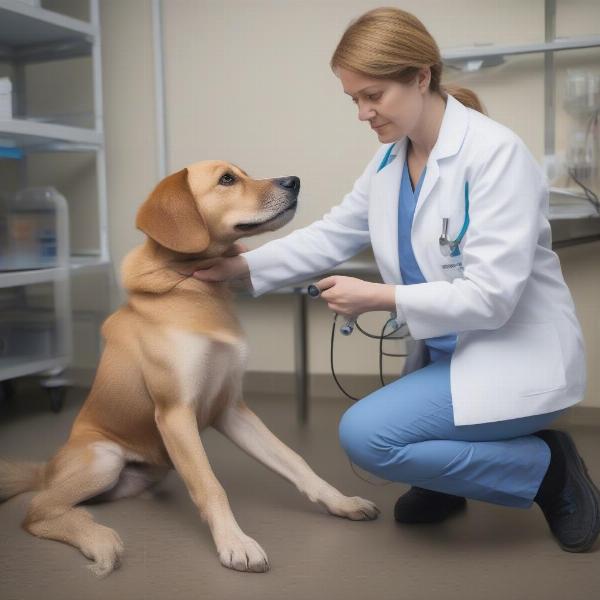Shaking hind legs in dogs can be alarming for any owner. This trembling can range from a barely noticeable quiver to violent shaking and can be caused by a variety of factors, from simple excitement to serious underlying medical conditions. Understanding the potential reasons behind your dog’s shaking hind legs is crucial for ensuring their well-being. This article will delve into the common causes, when to seek veterinary attention, and how to best support your furry friend.
Why Are My Dog’s Back Legs Shaking?
There are numerous reasons why a dog’s hind legs might shake, ranging from completely benign to potentially serious. Identifying the underlying cause is key to providing the right care. Sometimes, the shaking is situational, such as after strenuous exercise or due to cold temperatures. In other cases, the trembling might be a symptom of a medical issue, like arthritis, neurological disorders, or even poisoning.
Common Causes of Shaking Hind Legs
- Old Age: Senior dogs often experience muscle weakness and joint pain, particularly in their hind legs, which can manifest as shaking. This can be related to conditions like arthritis or degenerative myelopathy. dogs back legs trembling
- Pain: Injury, arthritis, or other painful conditions can cause shaking in the affected limb. Observe your dog for any signs of limping, favoring a leg, or yelping when touched.
- Excitement or Anxiety: Just like humans, dogs can experience trembling due to strong emotions. This is typically temporary and resolves once the dog calms down.
- Low Blood Sugar (Hypoglycemia): This is more common in small breeds or puppies and can cause weakness and trembling, often accompanied by lethargy and confusion.
- Neurological Issues: Conditions affecting the nervous system, such as epilepsy, distemper, or certain types of tremors, can cause shaking in the legs. why do dogs legs shake
- Poisoning: Ingesting certain toxins can cause muscle tremors and weakness. This is a medical emergency and requires immediate veterinary attention.
- Generalized Tremor Syndrome (GTS): Also known as “white shaker dog syndrome,” GTS is characterized by full-body tremors, often more pronounced in the hind legs.
When Should I Worry About My Dog’s Shaky Legs?
While occasional trembling might not be a cause for immediate concern, persistent or worsening shaking warrants a veterinary visit. Look out for accompanying symptoms such as lethargy, loss of appetite, difficulty walking, or vocalization of pain.
Diagnosing the Cause of Shaking
A veterinarian will conduct a thorough physical exam and may recommend further tests, such as blood work, X-rays, or neurological evaluations, to pinpoint the cause of your dog’s shaking hind legs. Providing a detailed history of your dog’s symptoms, including when the shaking started, its frequency, and any other accompanying signs, will help the veterinarian reach a diagnosis.
Treatment Options for Shaking Hind Legs
Treatment depends entirely on the underlying cause. Pain management medications can help alleviate discomfort caused by arthritis or injuries. For neurological conditions, specific medications or therapies may be prescribed. In cases of hypoglycemia, providing a source of sugar can quickly resolve the shaking. dogs back legs shaking while standing
Supporting Your Dog at Home
Providing a comfortable and supportive environment is essential for dogs experiencing shaking hind legs. A soft bed, ramps for easy access to furniture, and maintaining a consistent exercise routine (as advised by your veterinarian) can significantly improve their quality of life. senior dog back legs weak
Conclusion
Shaking hind legs in dogs can signal a range of issues, from simple excitement to serious medical conditions. Careful observation, prompt veterinary attention when needed, and a supportive home environment are crucial for ensuring your dog’s comfort and well-being. Don’t hesitate to contact your veterinarian if you notice any unusual trembling in your furry friend.  Dog undergoing a veterinary exam for shaking legs
Dog undergoing a veterinary exam for shaking legs
FAQ
- My senior dog’s back legs are shaking. Is this normal? While some age-related changes are expected, shaking can indicate underlying issues like arthritis. Consult your veterinarian.
- My dog’s legs shake when he’s excited. Should I be worried? Occasional trembling due to excitement is usually harmless. However, if it’s excessive or accompanied by other symptoms, consult a vet.
- What are the signs of poisoning in dogs? Signs of poisoning can include tremors, vomiting, diarrhea, lethargy, and seizures. Seek immediate veterinary care.
- Can anxiety cause leg shaking in dogs? Yes, anxiety can manifest as trembling, especially in stressful situations.
- How is Generalized Tremor Syndrome treated? GTS is often treated with corticosteroids and other medications to manage the tremors.
- My dog’s back legs are shaking after a long walk. Is this serious? This could be due to muscle fatigue or even a minor injury. Monitor your dog, and if the shaking persists, consult your veterinarian.
- What can I do at home to help my dog with shaky legs? Provide a comfortable bed, use ramps for easy access to furniture, and maintain a consistent exercise routine as recommended by your veterinarian.
ILM Dog is a leading online resource dedicated to providing expert advice on dog care, breeds, health, training, nutrition, and more. We connect pet owners worldwide with reliable information and practical tips to enhance their canine companions’ lives. From choosing the right breed to understanding complex health issues, ILM Dog is your trusted partner in responsible dog ownership. Contact us today for personalized guidance and support: Email: [email protected], Phone: +44 20-3965-8624. ILM Dog is committed to providing the best possible care for your beloved furry friend.